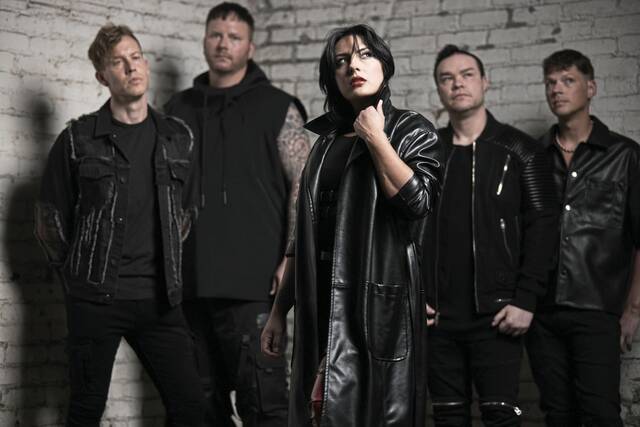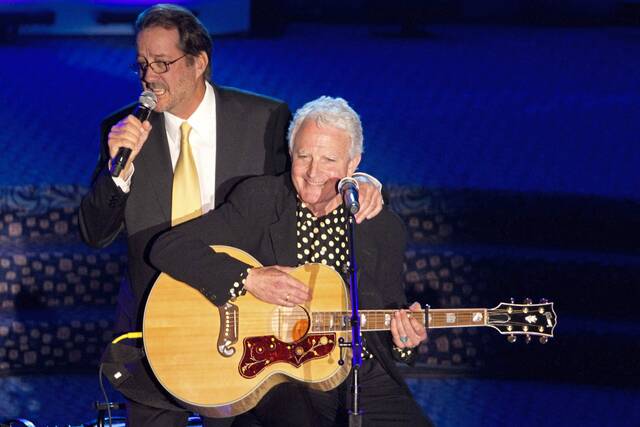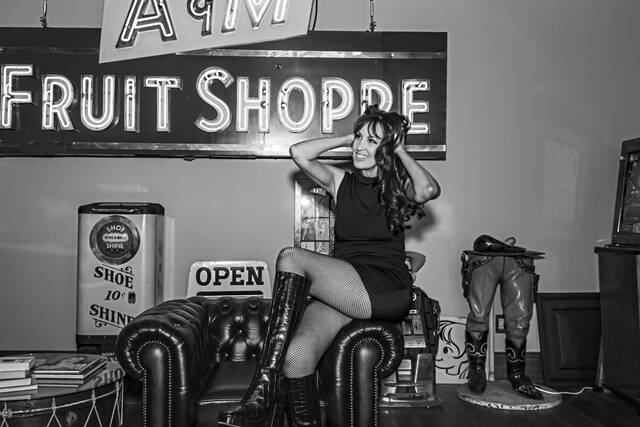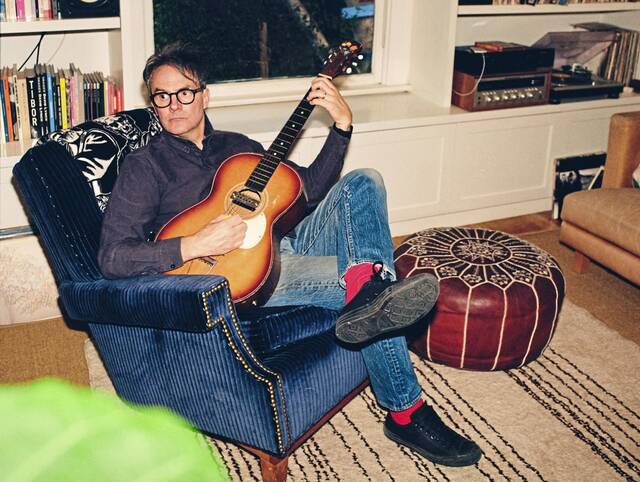Baroness frontman John Baizley had always felt a little resistant to the idea of playing older albums in full live. But he gradually warmed up to the concept, with the progressive metal band playing their first two releases, “Red Album” and “Blue Record,” at a pre-holiday show in December.
The veteran band, which formed in 2003, is now taking those albums on the road for their Red and Blue tour, which will hit Thunderbird Music Hall in Pittsburgh’s Lawrenceville neighborhood on May 31.
In previous tours, Baizley said he’s always made it a point to play at least one song from every album, but this trek has the band revisiting songs that had never been played outside the studio. And describing himself as “a little antagonistic,” the tour isn’t pegged to any particular anniversary, with “Red Album” released in 2007 and “Blue Record” in 2008.
Baizley, who sings and plays guitar, is the only remaining member from those early days, having been joined by drummer Sebastian Thomas and bassist Nick Jost in 2013, with lead guitarist Gina Gleason entering in 2017.
“I think one of the things we were hoping through the process was that in digging back into these records so deeply and so specifically that we in 2025 might learn a few things that we had neglected to focus on during the past two decades,” he said. “And I can now say that idea was a good one because I think what’s happening now is we’re uncovering some musical ideas, some ideas in terms of arrangement or presentation, that we haven’t really engaged with in decades. And they feel fairly exciting to us. So it very likely will inform the next music that we do in some way, shape or form.”
In a call from Philadelphia before the tour started, Baizley delved further into the “Red” and “Blue” albums, offered an update on their new album and more:
Was it interesting to view these two albums through the lenses of 18 and 16 years later?
Yeah, it was. But I think, prior to uncovering these records in such a thorough way, my fear was that it would be a little overly nostalgic or create some kind of time perception dissonance that would be negative and maybe bum me out a little bit. But it’s actually kind of cool. It’s been surprising to me with a couple of these songs that I swear I’ve never played since we walked out of the studio. So it’s been surprising to learn these songs and see how complex they are in some ways, complex in a fashion that I think we distanced ourselves from for one reason or another. It’s not like going back to early material and going, oh, this one’s really juvenile or this is really kind of stupid where we were at that time. In fact, with most of the songs that we’re having to relearn it’s like, oh, these are actually much more technically sophisticated than I would have given them credit for. And holy (expletive), we need to practice.
Do some of these songs have a new vibe since it’s with a totally different lineup than when they were originally recorded?
I think not only has that naturally organically happened, but if it didn’t, in fact, I would try to force that to happen a little bit. But thanks to the musicianship of Gina and Sebastian and Nick, I think what we’re able to do is hopefully do service to these songs that those three weren’t part of the recording process for, to sort of imbue them with a more contemporary swagger. Some of the differences are due simply to the fact that the personnel has changed over the years. As a musician and as an artist, I rely on the specific characteristics of each of the four of us to generate spark and energy and life in all of our music, both past and present.
It’s a really interesting thing to refine yourself or refine your vision to a very specific part of your history and to hope that its contemporary form is something that’s interesting and compelling. But to discover that it maybe would have been all along, not only is it sort of fun to play these songs and challenging in a musical way that we require as musicians, but it’s also interesting for me to hear those differences, whether they’re the subtle changes that have happened over the years, or the more dramatic differences.
I always love seeing how subtle changes in that song occurred over the years that were organic improvements or the natural outcome of having different musicians play or something that just due to our age as musicians and our experience, we approach them somewhat differently than we did when we were young. So, I think all of these subtle changes counterbalance against the similarities, and some songs we have to strictly adhere to the script because that’s the way that they’re written and that’s the way they’re arranged.
Further to that, the way that we’re presenting this tour, which is “Red” and “Blue” in their entirety, means that we’re going to adhere to the sequencing on those records as well, which is something that I took great pains, something I really took a lot of time sequencing “Red” and “Blue.” All of our records, the sequencing is critically important to me, but it has nothing to do with the way I would sequence a live show. Not having the ability to make those adjustments when presenting this live has actually led to maybe even a different perspective on how we perform the songs, because I know in a live setting, the journey that you take a listener on, it’s a different experience than when you’re presenting them as something that’s recorded and mixed and mastered and commercialized like that.
It looks like some of those songs are like “Wailing Wintry Wind,” “Aleph” or “O’er Hell and Hide,” so how did it feel to first play those again?
It was a little nerve wracking because typically with the music that I’ve written over the years, all of those records are written on my musical tendencies, so I know that regardless of how much rehearsing I do before we play it as a group, I know something innate is happening there. There are some instinctual chord changes or phrasings that have always been with me that are not going to be a challenge for me to learn. … So it was really cool because the last week we were in rehearsals, the week before that we were in rehearsals, and each day is like we’re a little bit better than the day before, but the fact that we were able to take a song like “Aleph” or “O’er Hell and Hide,” which we played last weekend for the first time ever since the recording sessions, it was amazing that we were able to not just get through the song, but understand the song the first time that we as a four-piece had ever put the music together.
It’s fun because some of those songs are relatively challenging, both from a technical and from a performance standpoint. There’s also so many songs that are just part of our live DNA at this point. So I think it’s gonna be interesting to see, as we put this together in a 90-minute set, how the electric energy levels of confidence peak and valley throughout the night. After a week or two, we’ll be just as good with the old songs as we are with the new, but it’s very rare in my career that I get an opportunity to be somewhat nervous or to have a sort of question mark while I’m performing. And I don’t mean that in a negative way. I mean that it’s extremely exciting not to feel completely confident. The idea of discovering where the song goes while you’re playing it is something that I think is a rare magical moment that happens in songwriting that very quickly, through routine and repetition, goes away. I think, especially the first week of the tour, it’s going to be really fun because there’ll be, for us as performers, we’ll be on the edge of our seats a little bit as well.
With digging into these older albums, can you see the path that you took from “Red” to “Blue” to where the band is now?
Yeah, and it’s been validating in a way because I remember I’ve always had a fairly simplistic concept about how you go from one record to another, in terms of concept, in terms of execution. My theory has always been that you just take whatever the real definable strong point of your former record was and ignore that when writing the next one. If “Red” was really intense and heavy, then we didn’t feel the need to focus on intensity and “heaviness” for “Blue.” And if “Blue” was this dense, technical, progressive thing, when we moved on to the record after that, “Yellow & Green,” we didn’t need to focus on complexity. We were able to write something more simple.
So it’s nice to see how that actually is an inexorable truth moving from the material of “Red” into the material of “Blue.” And I think being more familiar with the more recent records, it’s also interesting to see how “Blue” transitioned to “Yellow & Green.” So I feel like we had some ideas in 2007 and 2009 with respect to “Red” and “Blue” that didn’t pay out their dividends until more recently. It’s been nice to see that that’s been the case all along, that in fact, in between our records, we really did make a concerted effort to not just to evolve and to improve ourselves, but to make what I think were fairly dramatic changes just for the sake of keeping ourselves interested and engaged in our music.
When the four of us are playing now, it’s very easy to tell in the set of “Red” that musically, it’s a very different record than “Blue.” So it’ll be fun to chronologically stack these songs for an audience. … I think the beautiful thing about an audience is we really consider it like it’s such a critical piece of our show, that in sports they say, play the man, not the ball. It’ll be interesting for me to see how the audience wants us to play these songs and how we can create a dramatic or a cinematic experience as a set with these songs, rather than just trying to stack them and order them in a way that we know will work. In fact we’ll have to do that sort of on a micro level within the songs.
Related
• 2024: Baroness bassist Nick Jost talks touring, danceable metal and more ahead of Pittsburgh show• 2023: John Dyer Baizley of Baroness on creating 'Stone' album, artwork and glockenspiel
• 2025 Pittsburgh area concert calendar
Is it possible that you would not play them in order?
We’re gonna play them in order. Initially when we decided to do this, I didn’t want to rope us too strictly into sticking to the sequence. Last year I saw Interpol was doing one of their big records and that was all sequential, and I was talking to my wife about it. She’s like, no, you have to do this in order. It doesn’t make sense if you don’t do that. What’s the special reason to see this if you’re not doing something that you’ve never done before and holding yourself to that standard?
That was all the push over the edge that I needed. Now the difficult thing is, well, what if the songs that we normally close with are now the second and third songs in the set? It’s going to be weird. We can’t change the way something starts. We can’t change the way that it ends in terms of that song sequence. So the work for us as musicians is to make it feel compelling and feel like a beginning, feel like a middle and feel like an end.
You mentioned that you’re working on a new record, so is this tour a little break from it? Does that help you come back at the new record with a fresh perspective?
Yeah, I think so. We were on tour all last year. So the first four months of this year, I think we intended to be writing a little bit more, but there have been a handful of touring opportunities that have come up for us. So for instance, (in February and March), we were in South America. So I think some of this live music has sort of prevented us from really dedicating fully to the new thing. But the end of this tour will mark a very definite beginning to the serious portion of writing the next one, and hopefully inform it in an interesting way.








